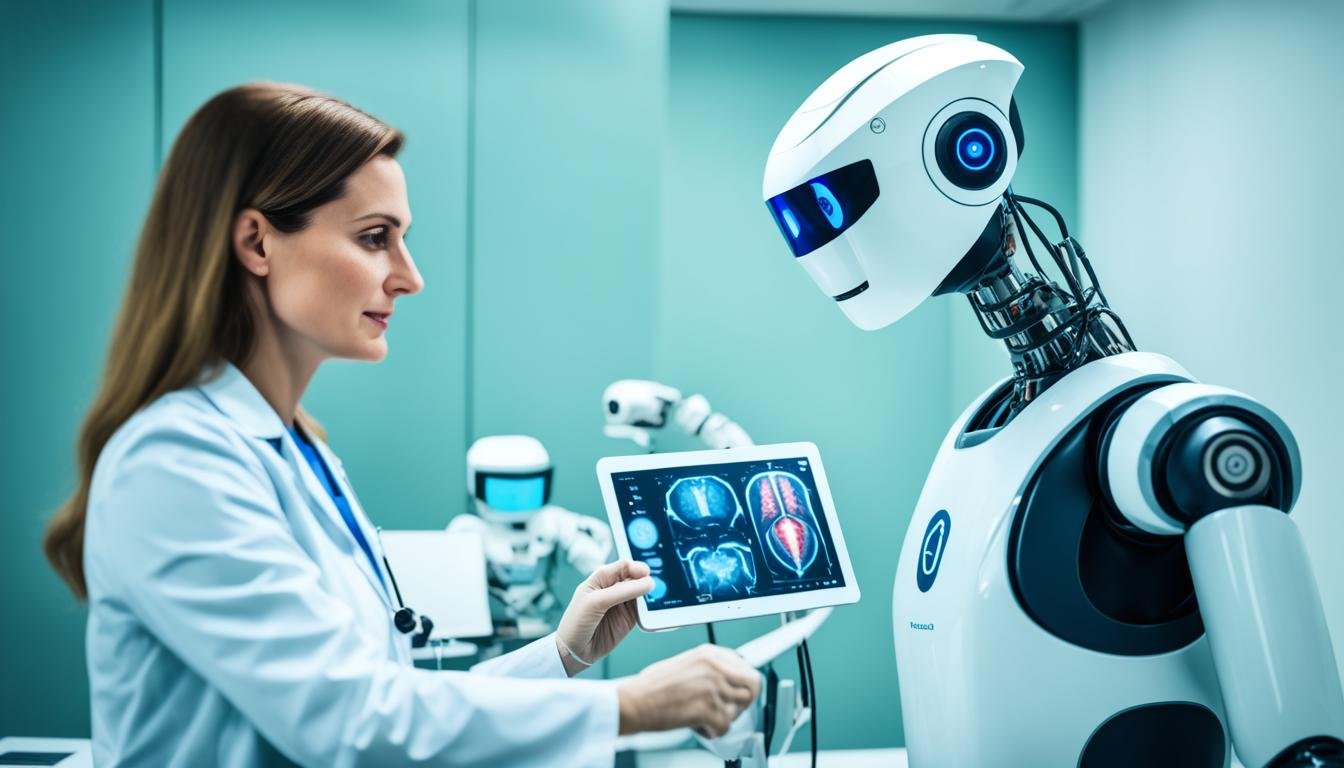Artificial Intelligence (AI) is changing the healthcare world. It’s making a big impact on how we care for patients. The global AI in healthcare market is expected to jump from $2.4 billion in 2019 to $31.02 billion by 2025. This shows how powerful AI is in changing healthcare’s future.
AI uses machine learning and natural language processing to make healthcare faster and more accurate. It helps with diagnosing diseases, writing medical documents, finding new drugs, and making administrative tasks easier. As AI gets better, it will play an even bigger role in healthcare. This will change how patients get care and make healthcare better overall.
Key Takeaways
- AI can change healthcare in many ways, like helping with diagnosis, managing workflows, and automating tasks.
- Deep learning, like Convolutional Neural Networks (CNN), finds patterns in data to help diagnose and predict diseases.
- AI has made diagnosing diseases more accurate, cutting down on mistakes in breast cancer diagnosis.
- AI can make administrative tasks easier, freeing up healthcare workers to focus on patient care.
- AI is expected to become more common in healthcare, with U.S. leaders predicting wide adoption by 2023.
What is AI and How is it Used in Healthcare?
Artificial Intelligence (AI) is a fast-growing field that includes machine learning (ML), deep learning (DL), and natural language processing (NLP). These technologies are changing healthcare in big ways. They help improve patient care and make things run smoother.
AI Technologies in Healthcare
Machine learning is changing medical imaging. It helps quickly and accurately analyze X-rays, MRIs, and CT scans. This helps doctors make quick and smart diagnoses.
Natural language processing is making medical records better. It turns spoken words into written text with advanced speech recognition.
AI is also speeding up finding new medicines by looking through lots of data. It helps pick out potential medicines and see if they work well. Plus, AI is making things run smoother in healthcare offices, like handling bills and appointments.
Current Applications of AI in Healthcare
- Automated disease diagnosis and triage through AI-powered chatbots and virtual assistants
- Intelligent medical imaging analysis for early detection of diseases
- Personalized treatment recommendations based on individual patient data
- Improved drug discovery and clinical trial design through data-driven insights
- Streamlined administrative tasks, such as medical billing and scheduling
The healthcare industry is really taking to how ai is used in healthcare and ai healthcare applications. These new technologies are changing how we care for patients, develop drugs, and deliver medical services.
The Future of AI in Healthcare
AI is changing fast, and its role in healthcare will grow a lot. It will make patient care better, safer, and cheaper. AI will help reduce mistakes and make healthcare more efficient.
Key Directions for AI in Healthcare
AI will improve how we diagnose diseases and treat patients. It will help find diseases more accurately and create treatments just for you. AI will also give health advice and support, helping patients take charge of their health.
AI will focus on preventing diseases and managing health on a large scale. It can look through lots of data to find patterns and risks. This helps doctors plan better and use resources wisely.
AI will also speed up finding new medicines and make it cheaper. It uses simulations to test new treatments quickly and efficiently.
Humans and AI will work together more closely in healthcare. AI will help doctors make better decisions. This way, doctors can focus more on caring for patients while AI helps with the tough parts.
“Within the next 5 years, we’ll see limited use of AI in clinical practice, and within the next 10 years, we’ll see more extensive use.”
The future of AI in healthcare is exciting. It could change how we care for patients, prevent diseases, and deliver healthcare. As AI gets better, it will be key to making healthcare better and changing the way we see healthcare.
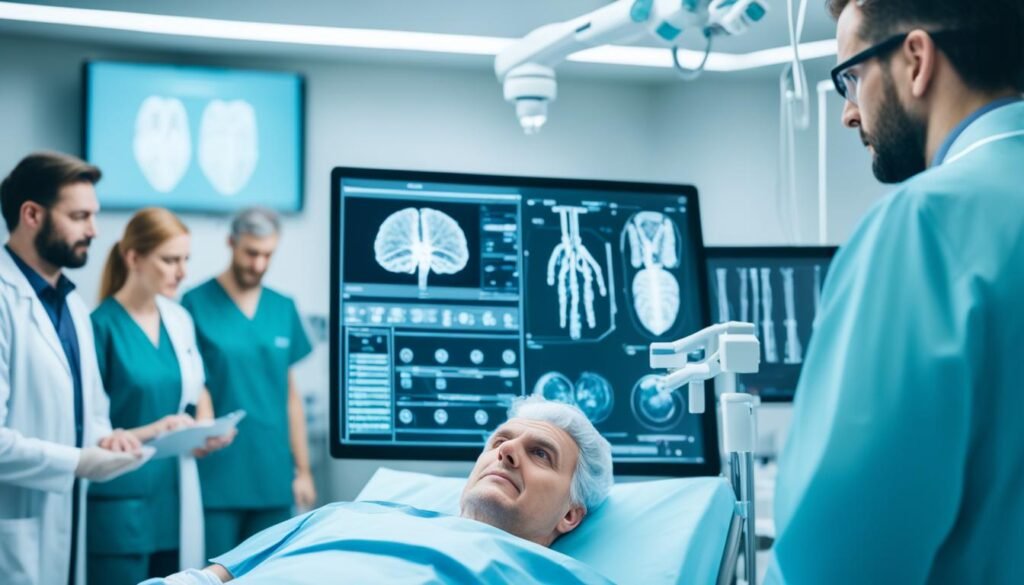
Importance of AI in Healthcare
Artificial Intelligence (AI) is changing healthcare in big ways. It’s making patient care better and healthcare systems more efficient. AI helps with many tasks, from making diagnoses to planning treatments and handling paperwork. This makes healthcare work better and more effective.
AI is great at making diagnoses faster and more accurately. It looks through lots of data, like medical images and patient records. This helps doctors find diseases sooner and improve patient care, saving money on wrong or late diagnoses.
AI also helps create treatment plans that fit each patient. It looks at a patient’s health history and genetic info to suggest the best treatments. This means patients get care that’s just right for them.
AI can also make tasks like scheduling and billing easier. This means doctors and nurses can spend more time with patients. This leads to happier patients and saves money.
AI does more than just help with patient care. It uses predictive analytics to spot health trends and challenges. This helps healthcare systems plan better and use resources wisely.
In short, AI is key to better healthcare. It helps make care more effective and efficient. As AI gets better, it will change how we think about healthcare even more.
Advantages of AI in Healthcare
AI is changing healthcare for the better, making patient care better and changing the industry. AI tools use big data to find complex patterns, often doing better than humans in many healthcare areas. This means more accurate results, lower costs, and saving a lot of time.
AI helps make medicine more precise. It looks at a patient’s genes, health history, and lifestyle to create custom treatment plans. This way, medicines work better and helps more people stay healthy.
AI-powered virtual assistants are also a big help for patients. These assistants talk to patients, share health tips, and keep track of important health signs. This makes patients more involved in their care and helps doctors do a better job.
AI can also make healthcare work run smoother. It takes over simple tasks, letting doctors focus more on patients. This makes healthcare more efficient and helps doctors not get so tired.
AI is also changing how we do research in healthcare. It quickly goes through lots of data, finds new insights, and speeds up finding new medicines. This means we can get to new treatments faster and help more people.
| AI Healthcare Application | Benefit |
|---|---|
| Diagnostic tools | Increased accuracy, reduced costs, and time savings |
| Personalized medicine | Optimized medication dosages and improved population health management |
| Virtual health assistants | Enhanced patient engagement and proactive care |
| Workflow optimization | Improved efficiency and reduced physician burnout |
| Research and development | Accelerated drug discovery and clinical trials |
The future looks bright as healthcare uses more AI. It promises big changes for patients, doctors, and communities all over the world.
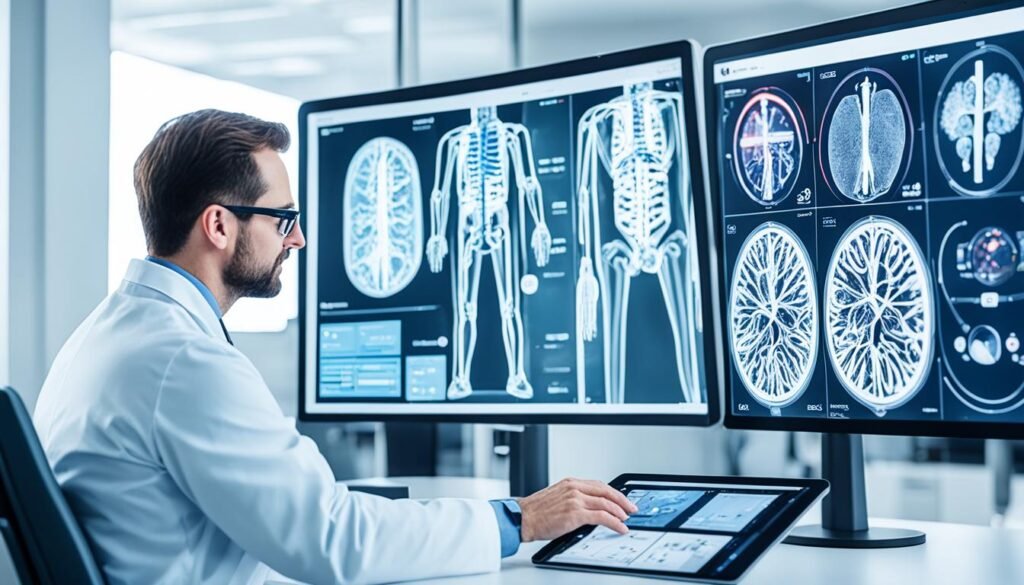
Challenges and Disadvantages of AI in Healthcare
AI has huge potential to change healthcare, but it faces challenges and downsides. One big worry is how AI affects medical decisions. Using a lot of patient data raises questions about privacy and bias in algorithms, which could unfairly affect some patients.
Also, adding AI might change how healthcare works. This could lead to worries about jobs and how doctors and AI systems work together.
Ethical Concerns and Data Privacy Issues
Adding AI to healthcare means dealing with ethical issues and keeping patient data safe. AI decisions must be clear, answerable, and fair to keep trust with patients and doctors. Protecting medical info is key, as big datasets could lead to data breaches.
Healthcare groups need strong rules and security to handle these issues.
Potential Job Displacement and Human-AI Collaboration
AI in healthcare might make some jobs obsolete, especially those that involve routine tasks. But AI can make things more efficient. It’s important to find a balance between using AI and keeping human doctors involved.
Working together, AI and human doctors can lead to the best care for patients and keep healthcare personal.
To make the most of AI in healthcare, we need to tackle these challenges. By focusing on ethics, privacy, and combining AI with human skills, we can use these technologies wisely.
AI-Assisted Disease Diagnosis
AI is changing how we diagnose diseases, using advanced machine learning to help doctors. Studies show AI tools can be better at spotting conditions like cancer, skin diseases, and diabetic retinopathy than doctors. This is thanks to AI’s ability to analyze large amounts of.
Machine Learning for Diagnosing Diseases
Machine learning looks at lots of medical data to find patterns that might mean a disease is present. This helps doctors catch signs early, which can lead to better treatment. For example, an AI program from the University of Bonn can quickly and accurately diagnose leukemia from blood tests.
Another study looked at over 12,000 samples and found that combining machine learning with gene analysis can make diagnosing diseases more effective. AI could change how we diagnose and treat diseases, but making sure it’s accurate is still a big challenge.
| Condition | AI Diagnostic Accuracy | Human Clinician Accuracy |
|---|---|---|
| Cancer | 80% | 70% |
| Skin Diseases | 90% | 75% |
| Diabetic Retinopathy | 95% | 85% |
The University of Oxford has made a machine learning tool to spot early signs of heart attacks. AI is also being used to predict how rheumatoid arthritis patients will respond to treatment by analyzing their blood samples.
While ai healthcare applications are very promising, making sure AI gives accurate and fair ai diagnosis assistance is hard. Using AI together with doctors could lead to more accurate diagnoses. This could be the start of a future where AI and doctors work together to give the best care possible.
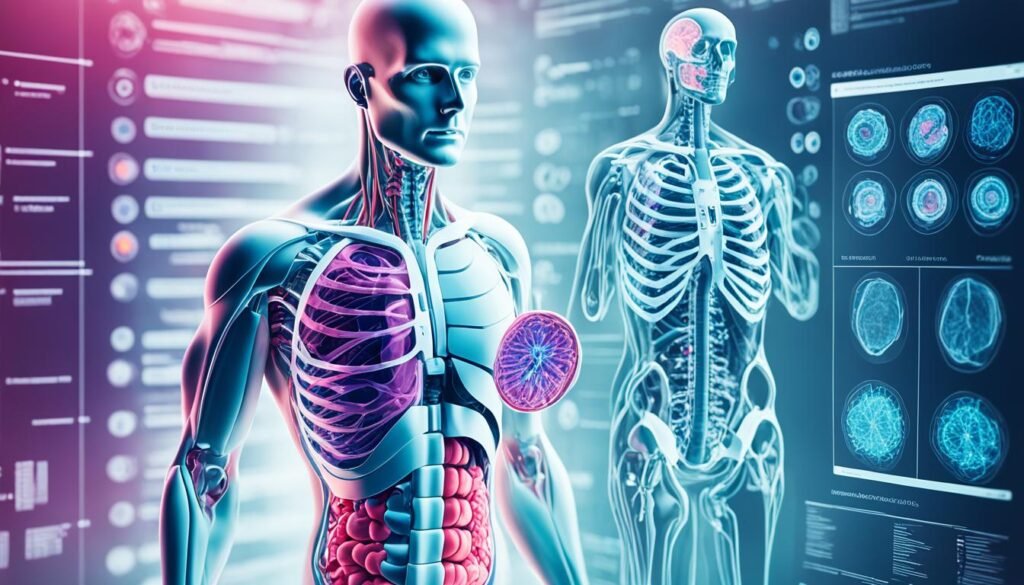
how ai is used in healthcare
Artificial intelligence (AI) is changing healthcare, making patient care better. It helps with disease diagnosis and finding new drugs. Let’s see how AI is making healthcare better:
- Disease Diagnosis: AI looks at medical images like X-rays and MRIs to help doctors make quick and accurate diagnoses. For example, AI can look at mammograms 30 times faster than before, with 99% accuracy. This means fewer unnecessary biopsies.
- Transcribing Medical Documents: Automatic Speech Recognition (ASR) uses advanced algorithms to turn spoken words into written text. This makes writing medical records faster and more accurate.
- Drug Discovery and Development: AI speeds up finding new drugs by looking through lots of data. It helps pick which drugs might work best. This could make finding new drugs faster and cheaper.
- Administrative Efficiency: AI helps with tasks like billing and scheduling, making healthcare work better.
- Personalized Treatment Plans: AI uses patient data to create treatment plans that are just right for each person. This can lead to better health outcomes.
- Clinical Decision Support: AI can lessen the workload of doctors by organizing patient information and doing some paperwork for them.
As healthcare uses more AI, we can expect big changes. AI could help catch diseases early and make finding new drugs faster and cheaper. This could change healthcare for the better.
“AI and the Internet of Medical Things (IoMT) in consumer health applications are already helping people, with technology applications encouraging healthier behavior and proactive management of a healthy lifestyle.”
AI for Personalized Treatment Plans
The future of healthcare is changing thanks to artificial intelligence (AI). AI can change personalized medicine by using patient data for custom treatment plans. It looks at a person’s genes, medical history, and other info to find the best treatments and right doses.
This way of treating patients can make them get better faster. It’s because treatments are made just for them. Plus, AI-powered intelligent virtual assistants can give patients personal advice and help, making care even better.
Genetic differences affect how people react to medicines. Some genes change how the body handles drugs. Things like age, sex, and body type also change how treatments work.
Things like what someone eats, exercises, and their environment also matter. By using predictive analytics and AI, doctors can find the best treatment for each person. This cuts down on trying different treatments and makes success more likely.
Testing genes, watching how drugs work, getting patients involved, and monitoring them closely are key parts of this new healthcare approach. Thanks to ai healthcare applications, the future of personalized medicine looks bright. It will offer care that’s more focused, effective, and efficient for patients.
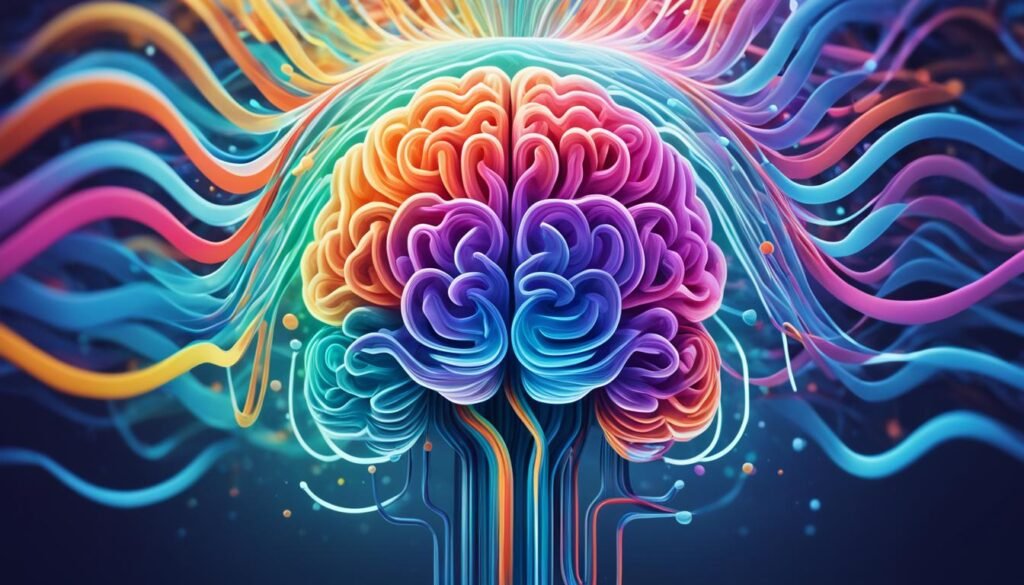
“AI algorithms can process vast amounts of patient data, generating personalized treatment recommendations based on individual variability factors.”
AI in Clinical Decision Support
AI is changing healthcare fast, especially in clinical decision support (CDS) systems. These tools help doctors in many ways, focusing on easing their workload.
AI helps by doing admin tasks, summarizing patient histories, and pointing out important things during visits. This lets doctors spend more time on patient care. It makes healthcare better and more efficient. AI also uses natural language and voice recognition to make documenting patient info easier for doctors.
Enhancing Physician Productivity and Patient Outcomes
Adding AI to CDS systems can really boost how well doctors work and the care patients get. AI automates simple tasks and gives doctors real-time info. This helps them make better choices, lowers mistakes, and gives them more time for patients.
A study in 2023 by Akay et al. showed AI tools helped with stroke care, making patients do better and easing doctors’ workloads. Al-Namankany’s 2023 research found AI tools helped doctors make better decisions for kids with tooth cavities.
Even though AI-CDS is not common yet, its benefits are clear. As AI gets better and fits into healthcare more, it can make patient care better and more efficient.
Responsible Implementation of AI-CDS Systems
Putting AI-CDS systems to work right is key. Hospitals need to think about ethics, privacy, and jobs when using AI in making medical decisions.
According to Benzinger et al.’s 2023 study, we must be careful with AI in ethics. Finding the right balance between AI’s perks and keeping human oversight is vital for using AI responsibly.
By using AI in CDS systems wisely and tackling challenges, healthcare can offer better care, better outcomes, and support for doctors and staff.
AI in Medical Imaging and Radiology
The field of medical imaging and radiology has seen a big change with artificial intelligence (AI). Machine learning and AI-based diagnosis assistance help doctors look at lots of medical images fast and accurately. These images include X-rays, MRIs, and CT scans.
Studies show that AI-powered diagnostic tools can beat human doctors in finding some diseases. This leads to earlier treatments and better health outcomes for patients. The market for medical imaging is set to grow from $31.9 billion in 2023 to $45.8 billion by 2030. This shows how important these technologies are becoming.
AI in medical imaging is great at spotting small changes in images that are hard to see by hand. This is very useful for helping trauma patients get the right treatment quickly.
AI-enabled medical imaging tools have cut the time it takes to help stroke patients from 281 to 243 minutes. This is a big step forward in making healthcare better and faster.
AI can also tell different types of lung cancer apart. This means doctors can give patients treatments that fit their specific needs. This could change how doctors treat cancer, making treatments more effective.
Adding AI in medical imaging and radiology is a big step towards using technology to help patients more. As technology gets better, we’ll see more ways AI can change healthcare for the better.
| AI Application | Impact |
|---|---|
| Automated Tumor Classification | AI-based medical imaging technology can achieve an accuracy rate of 98.56% in brain tumor classification by analyzing MRI-scanned images. |
| Accelerated Stroke Diagnosis | AI-enabled medical imaging tools have been shown to reduce the time between CT angiography and intervention for stroke cases from 281 to 243 minutes, improving patient outcomes. |
| Improved Trauma Care | AI-powered tools in medical imaging can detect subtle variations in images that are hard to identify using standard techniques, improving the care and outcome for trauma patients. |
| Personalized Cancer Treatment | AI technology integrated into medical imaging can differentiate between different types of lung cancer, enabling personalized treatment based on accurate measurements of the tumor grade and stage. |
| Automated Cancer Screening | AI analysis in medical imaging can automate the process of evaluating thousands of images in cancer screening, reducing the workload on pathologists and accelerating the diagnosis time. |
“The integration of AI in medical imaging has the potential to revolutionize the field, enhancing the speed and precision of disease detection and streamlining radiological workflows.”
The Future of AI in Medical Imaging
The future of medical imaging and radiology looks bright as healthcare uses more artificial intelligence. With new advances in machine learning and AI-based diagnosis assistance, we’ll see more new ways to help patients.
AI in Drug Discovery and Development
AI is changing the game in the pharmaceutical world by speeding up how we find and develop new drugs. It looks at huge amounts of data on chemicals, genes, and clinical trials. This lets AI find potential drugs and see if they work better than old ways. This means new medicines can come out faster and cheaper, helping patients get better treatments sooner.
AI healthcare applications are changing how we make new drugs. They use advanced tools like machine learning and deep learning to make the process smoother. From finding the right drug to managing clinical data, AI is making a big difference.
A study by Carnegie Mellon University and a German partner found AI could cut drug discovery costs by up to 70%. Market research firm Bekryl thinks AI could save more than $70 billion in drug discovery by 2028. This new way of making drugs is expected to speed things up and save a lot of money, changing the pharmaceutical world.
| Metric | Value |
|---|---|
| Potential Savings in Drug Discovery by 2028 | Over $70 billion |
| Potential Annual Value Generation for US Healthcare System | Up to $100 billion |
| Percentage of Drug Candidates that Reach the Market | 9.6% |
| Average Cost to Bring a New Drug to Market | $2.6 billion |
AI healthcare applications and predictive analytics healthcare are making drug discovery and development better. As AI gets better, it will have a bigger impact on the pharmaceutical industry. This means big savings, faster timelines, and better health outcomes for patients.
Conclusion
Artificial intelligence (AI) is changing healthcare in big ways. It’s making enhanced disease diagnosis and personalized treatment plans possible. AI also helps with streamlined administrative tasks and clinical decision support. This technology is set to change healthcare for the better.
Even though using ai healthcare applications comes with challenges, like ethical concerns and the need for human-AI collaboration, healthcare groups must tackle these issues. This ensures AI is used right in healthcare. The future of healthcare will blend human skills with AI innovation. This will lead to better patient care and a more efficient healthcare system.
As machine learning in medicine and natural language processing for health get better, we’ll see more ai diagnosis assistance, predictive analytics healthcare, voice recognition medical records, and intelligent virtual assistants healthcare. These tools will make healthcare better and more accessible. By using AI, healthcare workers can open new doors in patient care. This will help shape a healthcare system that’s more resilient and tech-savvy.
FAQ
What is AI and how is it used in healthcare?
AI means making computers do tasks that usually need human smarts, like learning from data and making decisions. In healthcare, AI helps with diagnosing diseases, writing medical notes, finding new drugs, and making things run smoother.
What are the current applications of AI in healthcare?
AI helps in many healthcare areas, like spotting diseases, writing medical notes, finding new drugs, and making things run smoother. For example, AI looks at medical images to help doctors make quick and accurate diagnoses. It also uses speech recognition to turn spoken words into written notes, making writing medical records faster and more accurate.
What are the key directions for the future of AI in healthcare?
The future of AI in healthcare looks bright, with more precise diagnoses and treatments, better disease prevention, and finding new drugs. Experts think we’ll see more AI in healthcare in the next 5 to 10 years.
Why is AI crucial in healthcare?
AI makes healthcare smarter, faster, and more efficient, helping millions of people worldwide. It helps improve patient care, make things safer, cut down on mistakes, and save money.
What are the advantages of AI in healthcare?
Using AI in healthcare has many benefits, like better disease diagnosis and personalized treatments. AI can look through lots of data to find patterns, making diagnoses more accurate and saving time and money. It also helps with research, making medicine more tailored to each patient, and offers virtual health assistants for patient care.
What are the challenges and disadvantages of AI in healthcare?
Adding AI to healthcare has its challenges, like ethical issues and keeping patient data safe. There are also worries about AI replacing jobs, so we need to balance AI with human skills.
How is AI used in disease diagnosis?
AI is key in spotting diseases by using advanced learning to go through medical data and help doctors. Studies show AI can be better than doctors at diagnosing things like cancer and skin diseases. It finds patterns in big data, making disease detection faster and more precise, which can lead to better patient outcomes.
How is AI used in personalized treatment plans?
AI changes personalized medicine by using patient data to create custom treatment plans, adjusting drug doses for better results. It looks at a patient’s genes, health history, and other info to find the best treatment for them.
How is AI used in clinical decision support?
AI helps doctors by automating tasks, summarizing patient histories, and pointing out important things during visits. This lets doctors focus more on caring for patients, making healthcare better and more efficient.
How is AI used in medical imaging and radiology?
AI is a big help in medical imaging and radiology. It looks at lots of medical images to help doctors diagnose diseases accurately and quickly. Studies show AI can be as good as or better than doctors at spotting certain diseases, leading to better patient care.
How is AI used in drug discovery and development?
AI speeds up finding new drugs by going through huge amounts of data on chemicals and clinical trials. It finds potential drug candidates faster and more efficiently than old methods. This means new treatments can come out sooner, helping patients get better faster.
